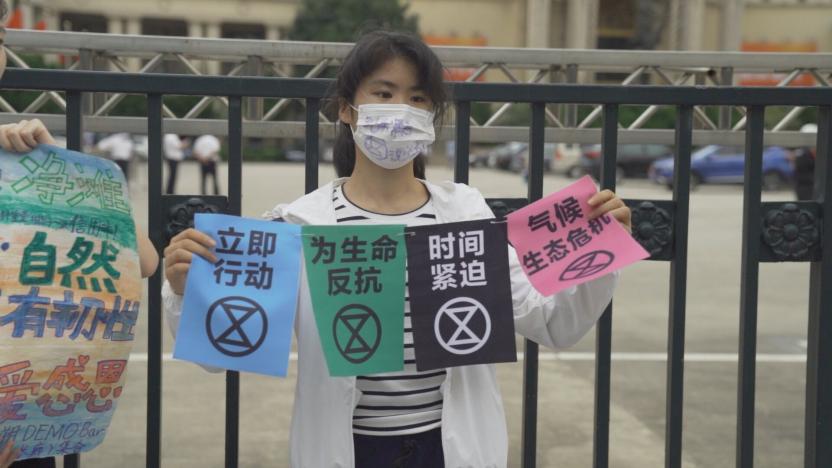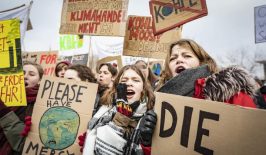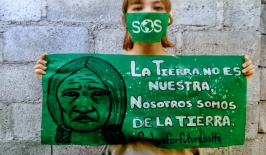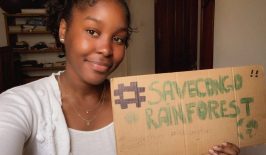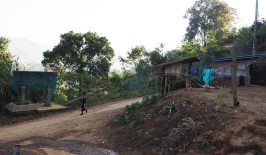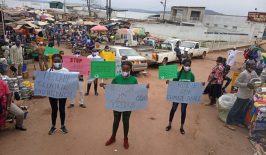Starting a movement to fight for action on climate change can be a struggle, and it’s even harder when you live in a country where collective action is frowned upon and questioning the government is most certainly discouraged. In this interview, we talk to Howey Ou, China’s first ever climate striker and a strong-willed leading voice in the country’s climate movement.
Not only are people in the Global South often among the most vulnerable to rising global temperatures, but they are also climate activists, educators and changemakers – fighting for a better world, innovating and inspiring others to tackle the issues that we as a planet face. In this series of interviews with environmental activists from Latin America, Africa and Asia, we want to do our bit to decolonise the conversation around climate change and lift up the underrepresented voices within the climate movement. Find all of the interviews in this Voices of Climate Justice series right here.
China emits more greenhouse gases than any other country on earth. Its cities are notorious for their extreme pollution and smog, and while the country has announced that it aims to achieve carbon neutrality before 2060 and is a leader in renewable energy capacity, it continues to invest in coal and greenhouse gas emissions continue to rise. But while in other countries around the world, millions of young people have taken to the streets to demand the governments take quicker action on climate change, in China that didn’t happen. Until Howey Ou came along. Known as China’s “first climate striker”, Howey skipped classes for a week in May 2019 to protest in front of government offices in Guilin in southern China. Greta Thunberg called her a “true hero” and her story went viral on social media, both inside and outside China, but her protest was cut short by police, she was interrogated by public security officials and she claims she was effectively barred from returning to school until she gives up her activism.
While she waited to be able to return to school, she began the initiative “Plant for Survival”, where she encouraged young people throughout China to plant more trees, and carried out her own tree planting projects in and around Giulin. She also travels the country meeting up with like-minded activists and environmentalists and was recently detained by police in Shanghai following a climate strike she carried out with others in the Chinese capital.
It‘s not surprising, then, perhaps, that this latest interview in our series has been a long time in the making. Communication with Howey was a challenge, as she had to send her answers to our questions to us as voice messages via an encrypted messaging app, which we then transcribed and wrote up. In this interview, RESET talks to Howey about the need for more environmental education, how the internet and social media (accessed via a VPN) were her gateway to the international Fridays for Future movement and what she does to recover when the pressure all gets too much.
How did you first get interested in the topic of climate change?
I first learned about the climate crisis when I was 16. On my birthday I invited my parents and some of my relatives to see the documentary “An Inconvenient Truth” by Al Gore. It was that movie that made me realise that this is the biggest threat facing human civilisation and also the Earth’s ecosystem. Before that I only knew about the climate crisis in very vague terms. I didn’t know how it affected our lives.
Most of my peers don’t understand the situation as well because they were not taught about it at school. Because our school teachers aren’t taught about it either. You rarely find alarming articles concerning the climate emergency or ecological collapse in any newspapers or on the radio. I think the officials in the government don’t know the situation. They didn’t get an environmental education either. Most people just don’t know this is a crisis and we are all facing an emergency.
Because every time we have a flood or a typhoon or some natural disaster related to the climate crisis, the newspapers always write things about the police officers going to the affected areas. They rarely describe or provide environmental education about the natural disasters. They just talk about how how brave and good the troops are, stepping up to help the people.
How has the coronavirus affected your protest?
Before the coronavirus, I used to go to flower and tree markets every Friday morning. I planted trees on nearby river banks or in wastelands with friends or I would go on my own in the afternoon. I usually water the trees every day if the places that I planted trees are near my house. In the first half of this year, I’ve taken some time to recuperate because from November last year to March this year my mood wasn’t good. I didn’t have much energy for activism because our actions were being criticised by millions of Chinese people. I took a few months to recover by retreating and reconnecting to nature and by meditating every day.
Earlier this year, we celebrated the one-year anniversary of China’s climate strike movement anniversary. Eleven activists from six cities in China joined in. Most of them did something online to celebrate the event, like drawing pictures of animals or earth and writing about them and then posting them to the Internet. I think things like that are a very good way to share the science and also allow more people to get involved and to do something that isn’t just about striking or protesting.
And what about your involvement in the school strikes? What was your motivation for getting involved?
I first heard about Greta Thunberg at the end of 2018. At the time I just had a little murmur in my heart that she is doing something crucially important. But at first I was uncomfortable with the aggression that she showed in her speeches.
In March 2019 I received a newsletter from Al Gore’s Climate Reality Project and it said that on March 15th there would be global school strike for the climate. That was the first time I really thought that maybe I could organise or take part in the movements from China. Soon after I just looked up their website and Wikipedia and I found that the 24th of May was the second global school strike. I then asked myself if I dared to stand up and take action.
I tried to get in touch with FFF International but at the time I didn’t know where to find them. So, I asked my foreign friends, via English-language apps, if they knew how to get connected with the movement. Finally, on that exact day I just created a Twitter account. I found that it’s very easy to connect to the movements using a VPN. Later I was able to get in touch with lots of different groups that were joining the movement around the world.
My motivation for getting involved was that I found that in March 2019 that there are more than 120 countries that had joined the movement, including Hong Kong, Macau and Taiwan but there was nothing from Mainland China. We are the country with the largest population and also the highest carbon emissions, so we must take a stand and accept this responsibility. And if no one else is going to do that, then I will be one of the first people to take action and not just stand by and be an observer.
The protests seem to be getting a lot of attention – but that’s not translating into much action to tackle climate change. What do you think is the main reason behind that?
I think that although the Fridays for Future movement in China has received a lot of attention, they have a lot less impact when compared to the big corporations and the people in power. They manage and regulate press, the radio and newspapers. There are not many media outlets that cover our protests, and they are not as powerful as the others. So, unfortunately I don’t think there is much of a general understanding of the climate emergency and the kind of protest that we are doing.
What does your poster say when you hold it up and who do you want to see it?
On the posters I write: “The climate crisis is the biggest threat to human civilisation” and “We need you to act. Join us!”. I held them up for the first time on the 24th of May and again from the 26th to the 31st of May last year. I want the passers-by to realise that this is the biggest threat to us all. Also, I want them to know that there are people have joined the movement in China – so they can join too. I wanted it to be an inspiration to those who are thinking about becoming part of the movement.
We hope to be able to create enough pressure on the corporations and the government that they finally act and we avoid a climate catastrophe.
Is there anything else you’d like our readers to know?
I have something to say to the people who would like to get involved. First how about starting out with something small, something you’re comfortable with: like talking to your parents, talking to your friends and class mates, doing some presentations at school, trying to do some projects on it. Of course, you could also follow Fridays for Future accounts on social media and join your local group too.
If you can’t participate in those local groups very much, then you could take the information from those movements down and share them with your classmates and the people you are familiar. Maybe they will even have the same idea as you and join you in carrying out some weekly protests with you.
Also, if you have been attacked for what you are saying or are feeling too overwhelmed with the feedback from people offline or online, and feeling upset about it day after day, then I suggest you go to forests or parks to reconnect to nature. Try to let go of those things you’re not comfortable with. Meditating alone in nature really helps to remind you to share the love and gratitude you have for Earth with everyone you meet and with every word you speak.
You can follow and support Howey’s protest by following her thoughts, journey, awareness-raising demonstrations, and run-ins with the authorities via her Twitter profile and also her Instagram account. Taking Howey’s lead, there is now a Fridays for Future movement based in China and that can also be found on Instagram here. You can also follow the broader movement advocating for more freedom for climate protests in China under the hashtag #LetChinaStrikeForClimate.
This article was co-authored by Jan Wisniewski and Marisa Pettit.
